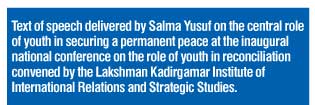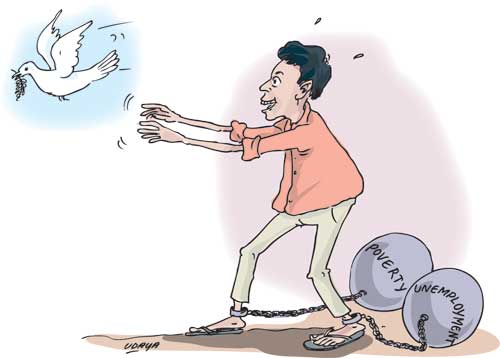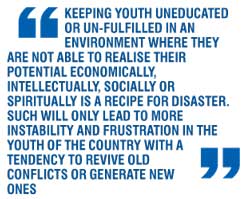Reply To:
Name - Reply Comment
Lankan Youth in Post-War Peace building

Can youth play a central role in securing a permanent peace? To answer this question it will help to ascertain whether youth played a role in generating conflict in the first place. In the case of Sri Lanka, it cannot be clearer: Initial youth uprisings which planted the seeds of the three-decade ethnic conflict are a fact in our country’s history. Both the ignition of the ethnic conflict and the JVP insurrections have stemmed  from our Universities as well as from other sections of the youth population.
from our Universities as well as from other sections of the youth population.
YOUTH UPRISINGS
The reasons for the uprisings were mainly due to perceptions of discrimination and lack of justice and fair-play that accompanied the introduction of standardisation in education. Successive Sri Lankan governments have tried and failed to find durable solutions to these issues. This has been mainly due to a failure to subject policies to rigorous scrutiny with regard to its implications for those affected by such policy, before implementation.
In the Sri Lankan context, from the viewpoint of the country’s youth, these problems were exacerbated by several other considerations, one of which was the increasing mismatch between education and manpower needs of the economy. By about the end of the first decades after independence, the educational system that had been shaped to cater to the requirements of an earlier era had remained unchanged.
POST-WAR
 Flash forward to the conclusion of the war in 2009. The call must now be for long-term stabilisation to consolidate the dividends that come with cessation of armed hostilities. Increased investment in the country’s most potent social capital becomes imperative in post-war efforts at development, security, reconciliation and peace-building. In contrast to most countries in the developing world, the case for investment in youth is very strong particularly in a country like Sri Lanka which records a high literacy rate of over 90%. This means that there already exists a resource pool with a degree of skills and knowledge which is an ideal springboard to move society to a largely middle – income status.
Flash forward to the conclusion of the war in 2009. The call must now be for long-term stabilisation to consolidate the dividends that come with cessation of armed hostilities. Increased investment in the country’s most potent social capital becomes imperative in post-war efforts at development, security, reconciliation and peace-building. In contrast to most countries in the developing world, the case for investment in youth is very strong particularly in a country like Sri Lanka which records a high literacy rate of over 90%. This means that there already exists a resource pool with a degree of skills and knowledge which is an ideal springboard to move society to a largely middle – income status.
A RECIPE FOR DISASTER
Keeping youth uneducated or un-fulfilled in an environment where they are not able to realise their potential economically, intellectually, socially or spiritually is a recipe for disaster. Such will only lead to more instability and frustration in the youth of the country with a tendency to revive old conflicts or generate new ones.
Disgruntled and disillusioned youth are among the gravest threats to the peace and stability of a country. Keeping youth marginalised and dependent provides impetus to war and other forms of collective violence which is either used as a means of self-assertion, or release from psychological stresses.
These alone are reasons enough to take youth seriously as we move on in post-war Sri Lanka. Such a strategy will not only be useful in securing a permanent peace but also in preventing the likelihood of future conflicts and tensions in the country.
RADICALISATION
 Moreover, the link between youth unemployment and political unrest in any society weakens the political system’s legitimacy and stability, and such conditions produce a climate of radicalisation particularly among unattached youth who have least to lose in the gamble and struggle for revolutionary gains. This can be dangerous in a country such as Sri Lanka emerging from the throes of a long-drawn out conflict and seeking a permanent peace.
Moreover, the link between youth unemployment and political unrest in any society weakens the political system’s legitimacy and stability, and such conditions produce a climate of radicalisation particularly among unattached youth who have least to lose in the gamble and struggle for revolutionary gains. This can be dangerous in a country such as Sri Lanka emerging from the throes of a long-drawn out conflict and seeking a permanent peace.
SPECIAL POWER
There are more reasons why youth have special power and potential in peace-building. First, young people are more open to change - Young people are searching for new ideas and open to new challenges while adults have already formed their dogmatic discourses.
Second, young people are future-oriented. Since they have more time ahead, they are willing to try alternatives and are more bound to “forget” the past than those who were directly involved in a painful moment of history.
Third, many revolutions were started and led by young students or activists. Students often have more time to think, read, meet colleagues and develop ideas. They also have more time to engage different activists groups. Students historically have always been in the vanguard of social change.
Fourth, youth also create ideas that solve old problems in innovative ways. Youth seek for alternative roots of power and influence.
Fifth, young people are also less experienced and willing to try new adventures. This risk-taking nature combined with a belief in a cause and a situation that cannot get worse pushes them to be courageous, especially when others believe that change is impossible.
Sixth and perhaps the most important case for calling for a role for youth in peace building is because a peace agreement’s endurance depends on whether the next generations accept or reject it, how they are socialised during the peace process, and their perceptions of what that peace process has achieved. Child and youth dimensions are central to the structural issues of peace building – such as inequality, poverty, and unemployment.
 A DUAL TRANSITION
A DUAL TRANSITION
In post-war Sri Lanka, youth experience a unique situation – they undergo a dual transition, that is, from youth to adulthood against a larger backdrop of the country’s conflict to peace transition. This dual transition is particularly challenging for the youth of our country and must be taken seriously in all national plans and programmes.
A GROSS OVERSIGHT
Sadly, most national initiatives and documents so far have not addressed our nation’s greatest asset even after three decades of conflict. This is a gross oversight in our peace-building efforts thus far. Any state that is truly committed to securing a permanent peace must focus on its youth not least because youth are the future of the country.
A NATIONAL STRATEGY
 Against such a backdrop, I would like to recommend for your consideration a five-pronged national strategy for Sri Lankan youth in post-war peace building. First, the call must be for a State-led programme for structured and constructive youth engagement. This must essentially involve a multi-faceted strategy that attends to the minds, the hearts and souls of the young people of the country.
Against such a backdrop, I would like to recommend for your consideration a five-pronged national strategy for Sri Lankan youth in post-war peace building. First, the call must be for a State-led programme for structured and constructive youth engagement. This must essentially involve a multi-faceted strategy that attends to the minds, the hearts and souls of the young people of the country.
Second, the youth dimension must be mainstreamed into all existing national policies and plans.
Third, cooperation from the international community in supporting such efforts must be welcomed mainly in the areas of sharing experiences of success stories of youth involvement in peace-building in other post-war contexts.
Fourth, the sharing of experiences and learning can also be a useful platform to engage young members of the Sri Lankan diaspora. Therefore, youth engagement will and must have connections to our multilateral and bilateral foreign policy efforts.
Fifth, further research, study, understanding and awareness of the integral link between youth unrest, conflict and peace-building in Sri Lanka must be put in place immediately.
 GOVERNMENT FOCUS
GOVERNMENT FOCUS
As a part of such a national strategy, urgent Government intervention must be taken to reverse current aspects of Sri Lankan society that contributed to initial discontent and frustrations in the youth of the country that diverted into conflict. The economic policy reforms of the late 1970s and its consequences must be addressed without delay to ensure that initial youth uprisings which lead to the conflict do not recur.
A second aspect that must be addressed is the increasing gap between regional and urban-rural disparities that exist in the social, economic and cultural opportunities available to the youth of the country. Certain parts of the country need special attention to redress prevailing imbalances. The effect of the war is such that the youth of the north and east must be given prioritised and immediate attention.
FIVE KEY AREAS
Five key areas need to be targeted for ensuring that youth are potent peace-builders in Sri Lanka in such a national strategy: The perception of youth as being granted equal opportunities and space for growth and development is critical.
In addition to job training and employment training for youth, young people should have access to training opportunities in conflict transformation, mediation, negotiation skills, facilitation of group decision making processes, project and organisational management and other themes of their interest and relevant to their social contexts.
Meaningful participation by the youth in political, inter-ethnic and cultural dialogue must be encouraged at all levels of social interaction. Youth should thereafter be given responsibilities according to their capacities and their contributions taken seriously.
Last and certainly not the least is the need for a sound value-based education for youth of the country. As famously said by the renowned educator Maria Montessori,’Establishing a lasting peace is the work of education; All politics can do is keep us out of war’.
[email protected]